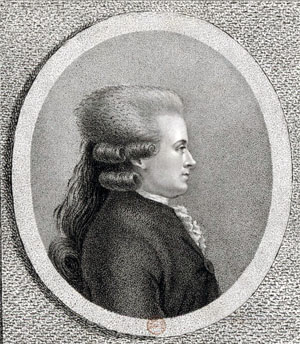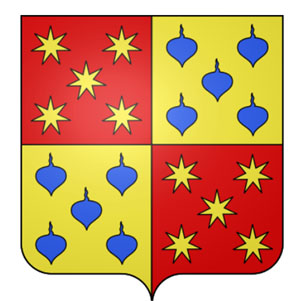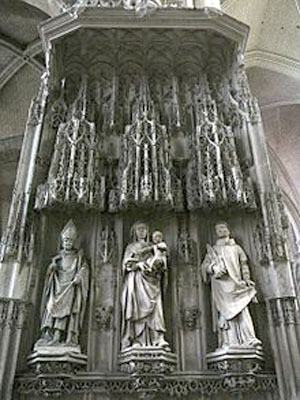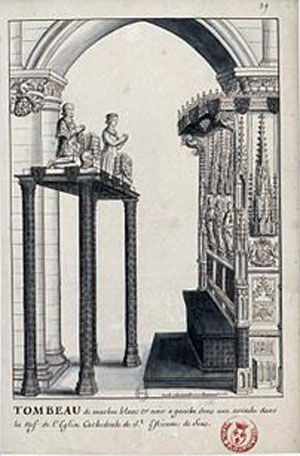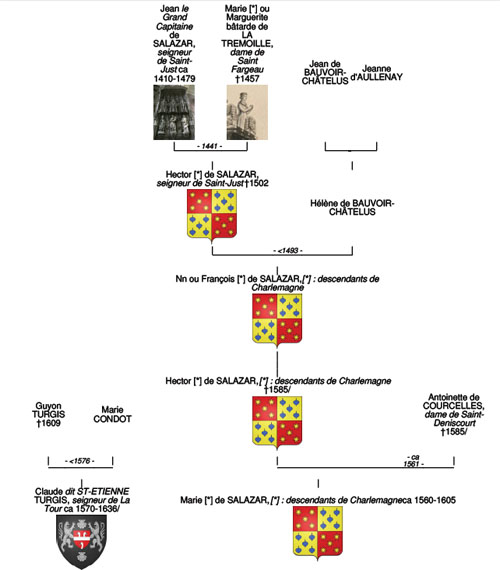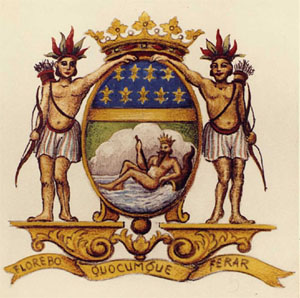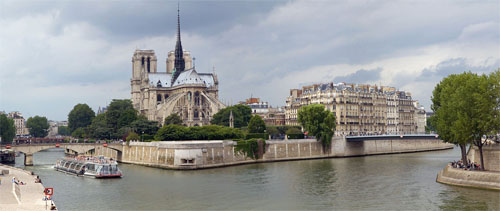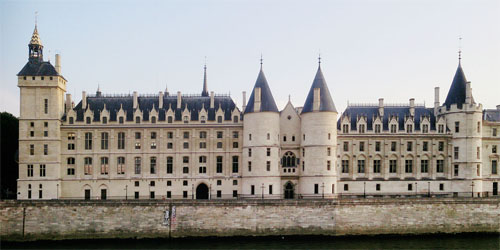Jean-Jacques Duval d'Eprémesnil
by Wikipedia
Accessed: 8/1/21Louis Barthelemy [b. 1695; d. 1760] was the son of a Montpellier merchant. He entered the Company’s service in 1728, and at this time he was of the Pondichery Council, after serving in Bengal. In 1746 he was second at Madras under d’Espremenil, and, when the latter retired to Pondichery, became chief there; but refused to remain when he was superseded by Paradis. He married a daughter of Dulaurens. Etat general des Employes en 1750 (Ministere des Colonies, C2 15); Weber, pp. 466, 467 ; Cf., infra under date July 15.
-- The Diary of Ananda Ranga Pillai, translated from the Tamil by Order of the Government of Madras, edited by H. Dodwell, M.A., Curator, Madras Record Office, Volume 4, 1916
Engraved portrait of Jean-Jacques Duval d'Eprémesnil
Jean-Jacques Duval d'Eprémesnil (5 December 1745 – 22 April 1794), French magistrate and politician, was born in India at Pondicherry, his father being a colleague of Joseph François Dupleix.[1]
Returning to France in 1750 he was educated in Paris for the law, and became in 1775 conseiller in the parlement of Paris, where he soon distinguished himself by his zealous defence of its rights against the royal prerogative. He showed bitter enmity to Marie Antoinette in the matter of the diamond necklace, and on 19 November 1787 he was the spokesman of the parlement in demanding the convocation of the states-general.[1]
When the court retaliated by an edict depriving the parlement of its functions, Eprémesnil bribed the printers to supply him with a copy before its promulgation, and this he read to the assembled parlement. A royal officer was sent to the palais de justice to arrest Eprémesnil and his chief supporter Goislard de Montsabert, but the parlement (5 May 1788) declared that they were all Eprémesnils, and the arrest was only effected on the next day on the voluntary surrender of the two members.[1]
After four months imprisonment on the island of Ste Marguerite, Eprémesnil found himself a popular hero, and was returned to the states-general as deputy of the nobility of the outlying districts of Paris. But with the rapid advance towards revolution his views changed; in his Réflexions impartiales ... (January 1789) he defended the monarchy, and he led the party among the nobility that refused to meet with the third estate until summoned to do so by royal command.[1]
In the Constituent Assembly he opposed every step towards the destruction of the monarchy. After a narrow escape from the fury of the Parisian populace in July 1792 he was imprisoned in the Abbey of Saint-Germain-des-Prés, but was set at liberty before the September Massacres. In September 1793, however, he was arrested at Le Havre, taken to Paris, and denounced to the Convention as an agent of Pitt. He was brought to trial before the revolutionary tribunal on 21 April 1794, and was guillotined the next day.[1]
D'Eprémesnil's speeches were collected in a small volume in 1823. See also Henri Carré, Un Précurseur inconscient de la Révolution (Paris, 1897).[1]
References
1. One or more of the preceding sentences incorporates text from a publication now in the public domain: Chisholm, Hugh, ed. (1911). "Éprémesnil, Jean Jacques Duval d'". Encyclopædia Britannica. 9 (11th ed.). Cambridge University Press. p. 708.
External links
• Media related to Jean-Jacques Duval d'Eprémesnil at Wikimedia Commons
Family Tree Owner:
Hello on the tree of Chantal ANNIC and Jean Louis BUSSIERE
You are welcome on this family tree where you will travel between the country of Auray for the Breton branch (ANNIC, LORHO, TOSTEN, GUEGAN), the combrailles Creusoises for the Auvergne and Limousine part (BUSSIERE, BARNONCEL, CROUZOL, MAZET, PAUFIQUE , RENARD, MOURLON, etc ...) with, depending on marriages and cousins, a large branch around Pondicherry (PERNON, de CLOSET, LE FAUCHEUR [THE GRIM REAPER]), and the Compagnie des Indes [East India Company] (therefore Ile de France and Ile Bourbon), cousins from Burgundy and elsewhere (from SERCEY, from VAUGELAS), and a branch of Chinese mandarins (WU, MENG))! Do not hesitate to point out any errors, confusions or additions and thank you in advance to all the contributors who made it possible to exchange useful information thanks to this formidable Génanet tool.
****************************
Genenet.org
Nicolas Olivier LE FAUCHEUR
• Born 21 November 1685 (Wednesday) - Rennes, 35238, Ille-et-Vilaine, Bretagne, France
• Deceased 2 March 1739 (Monday) - Puducherry, (Pondichéry, Inde Française), Tamil Nadu, INDIA, aged 53 years old
• Agent Supérieur de la Compagnie des Indes, Chef du comptoir de Mazulipatam [Senior Agent of the Compagnie des Indes, Head of the Mazulipatam counter]
Parents
• Hyacinthe LE FAUCHEUR, seigneur de Saint Mamert, born in July 1654 - Rennes, 35, Ille-et-Vilaine, Bretagne, France, deceased 26 January 1686 (Saturday) - Rennes, 35, Ille-et-Vilaine, Bretagne, France aged 31 years old
Married to
• Pétronelle ARMANDE
Spouses, children, grandchildren and great-grandchildren
• Married 29 October 1723 (Friday), Puducherry, (Pondichéry, Inde Française), Tamil Nadu, INDIA, to Jeanne Julienne Michelle ARTUR, born 30 August 1709 (Friday) - Brest (29), deceased (Parents : André ARTUR 1674- & Julie JEZÉQUEL 1682-) with
Jeanne Julienne Michelle ARTUR
• Born 30 August 1709 (Friday) - Brest (29)
• Deceased
Parents
• André ARTUR, born in 1674, deceased,
Garde magasin de la Cie des IndesAndré ARTUR
• Born in 1674
• Deceased
• Garde magasin de la Cie des Indes
Parents
o Claude ARTUR du CLOS, born about 1644, deceased 25 April 1695 (Monday) - Fougères (35) aged about 51 years old,
Procureur, Sergent Royal
Married to
• Marie LE DIEU, born in 1653, deceased
Married 6 February 1702 (Monday), Brest (29), to
• Julie JEZÉQUEL, born in 1682, deceased
Marie Jeanne Julie Adélaïde LE FAUCHEUR, comtesse du Saussay 1726- Married to Charles Nicolas DESVAUX du SAUSSAY, comte du Saussay †1772 with
Charles Nicolas DESVAUX du SAUSSAY
comte du Saussay
• Born - Paris, 75056, Paris, Île-de-France, France [DATE???]
• Deceased 13 December 1772 (Sunday) - Puducherry, (Pondichéry, Inde Française), Tamil Nadu, INDIA
Spouses and children
• Married to Marie Jeanne Julie Adélaïde LE FAUCHEUR, comtesse du Saussay, born in 1726 - Passe Notre Dame de la Délivrance, Mazulipatarn, Andhra, India, deceased (Parents: Nicolas Olivier LE FAUCHEUR 1685-1739 & Jeanne Julienne Michelle ARTUR 1709-) with
o Nicolas André Joseph DESVAUX du SAUSSAY 1752-
o Nicolas André Joseph DESVAUX du SAUSSAY 1752-
Marie Jeanne Julie Adélaïde LE FAUCHEUR, comtesse du Saussay 1726- Married to Simon LAGRENÉE de MÉZIÈRES, chevalier de Saint Louis 1730-1800
Simon LAGRENÉE de MÉZIÈRES
chevalier de Saint Louis [knight of saint louis]
• Born 5 June 1730 (Monday) - Saint-Paul, 97415, La Réunion, France DOM
• Deceased 30 June 1800 (Monday) - Puducherry, (Pondichéry, Inde Française), Tamil Nadu, INDIA, aged 70 years old
• Lieutenent Général de Police, puis Président de l'Assemblée Coloniale à Pondichéry [Lieutenant General of Police, then President of the Colonial Assembly in Pondicherry]
Parents
o François Melchior LAGRENÉE de MÉZIÈRES, born in 1699, deceased in 1735 aged 36 years old,
Commis Agent de la Compagnie des IndesFrançois Melchior LAGRENÉE de MÉZIÈRES
• Born in 1699
• Deceased in 1735, aged 36 years old
• Commis Agent de la Compagnie des Indes [Clerk Agent of the East India Company]
Married to
o Rose DUHAMEL, born in 1710, deceased in 1736 aged 26 years oldRose DUHAMEL
• Born in 1710
• Deceased in 1736, aged 26 years old
o Nicolas André Hyacinthe LE FAUCHEUR 1728-
Joseph François Nicolas Olivier LE FAUCHEUR 1731-1782 Married 27 April 1765 (Saturday), Negapatam, (Présidence de Madras, Inde Anglaise), INDE,[Presidency of Madras, British India, INDIA]
Joseph François Nicolas Olivier LE FAUCHEUR
• Born in 1731 - Puducherry, (Pondichéry, Inde Française), Tamil Nadu, INDIA
• Deceased 23 February 1782 (Saturday) - Puducherry, (Pondichéry, Inde Française), Tamil Nadu, INDIA, aged 51 years old
• Agent Supérieur de la Compagnie des Indes, Trésorier-général du comptoir de Pondichéry, Grand-Voyer du Roi de Pondichéry [Senior Agent of the Compagnie des Indes, Treasurer-General of the Pondicherry Counter, Grand-Voyer of the King of Pondicherry]
to Thérèse Michèle LE BUREL 1746-1824 with
Thérèse Michèle LE BUREL
• Born 16 March 1746 (Wednesday) - Karaikal, (Karical, Inde Française) Tamil Nadu, INDIA
• Deceased 22 June 1824 (Tuesday) - Puducherry, (Pondichéry, Inde Française), Tamil Nadu, INDIA, aged 78 years old
Parents
o Pierre LE BUREL,
Maître cannonier [Master cannonier]
Married to
o Marguerite COUESTE
o Jeanne Marie Josèphe LE FAUCHEUR 1766-1781
o Marie Thérèse LE FAUCHEUR 1769-1777
Brigitte Simone LE FAUCHEUR 1770-1806 Married about 1788 to Joseph Jacques Amédée WHITE †1818 with :
• Etienne François WHITE 1794-
Marie Thérèse Odon LE FAUCHEUR 1772- Married 31 January 1788 (Thursday), Puducherry, (Pondichéry, Inde Française), Tamil Nadu, INDIA, to Jean Bernard de VIENNE 1756-1819 with:
Jean Bernard de VIENNE
• Born 27 June 1756 (Sunday) - Auch, 32013, Gers, Midi-Pyrénées, France
• Deceased 19 January 1819 (Tuesday) - Port-Louis, Île Maurice, MAURITIUS, aged 62 years old
• Receveur des Domaines, Capitaine d'Infanterie, Greffier en Chef de la Cour d'Appel de l'Ile Maurice, Propriétaire Terrien à Moka [Receiver of Domains, Infantry Captain, Chief Registrar of the Mauritius Court of Appeal, Landowner in Moka]
Parents
• Jean Paul François de VIENNE, born 31 January 1730 (Tuesday) - Auch, 32013, Gers, Midi-Pyrénées, France, deceased before 8 December 1798, Capitaine de Dragons, Trésorier de la ville d'Auch, Président du Bureau des finances d'Auch (1766), Président au Conseil du Bureau des Trésorier de France, Premier Consul et Maire d'Auch (1782-1789) [Captain of Dragons, Treasurer of the city of Auch, President of the Finance Office of Auch (1766), President of the Council of the Treasurer's Office of France, First Consul and Mayor of Auch (1782-1789)]Jean Paul François de VIENNE
• Born 31 January 1730 (Tuesday) - Auch, 32013, Gers, Midi-Pyrénées, France
• Deceased before 8 December 1798
• Capitaine de Dragons, Trésorier de la ville d'Auch, Président du Bureau des finances d'Auch (/1766), Président au Conseil du Bureau des Trésorier de France, Premier Consul et Maire d'Auch (1782-1789)
Parents
• François Marie de VIENNE, born 10 May 1691 (Thursday) - Auch, 32013, Gers, Midi-Pyrénées, France, deceased 4 December 1752 (Monday) - Auch, 32013, Gers, Midi-Pyrénées, France aged 61 years old, Avocat, Premier Consul d'Auch (1727-1728), Procureur du Roy au Bureau des Finances de la Généralité d'Auch [Lawyer, First Consul of Auch (1727-1728), King's Prosecutor at the Finance Office of the Generalitat of Auch]François Marie de VIENNE
• Born 10 May 1691 (Thursday) - Auch, 32013, Gers, Midi-Pyrénées, France
• Deceased 4 December 1752 (Monday) - Auch, 32013, Gers, Midi-Pyrénées, France, aged 61 years old
• Avocat, Premier Consul d'Auch (1727-1728), Procureur du Roy au Bureau des Finances de la Généralité d'Auch
Parents
o Claude de VIENNE
Married to
o Jeanne de DOLS
Married 30 January 1720 (Tuesday), Auch, 32013, Gers, Midi-Pyrénées, France, to
• Thérèse de SEISSAN de MARIGNAN, born 2 June 1701 (Thursday) - Auch, 32013, Gers, Midi-Pyrénées, France, deceased 17 August 1733 (Monday) - Auch, 32013, Gers, Midi-Pyrénées, France aged 32 years oldThérèse de SEISSAN de MARIGNAN
• Born 2 June 1701 (Thursday) - Auch, 32013, Gers, Midi-Pyrénées, France
• Deceased 17 August 1733 (Monday) - Auch, 32013, Gers, Midi-Pyrénées, France, aged 32 years old
Parents
• Jean Bernard II de SEISSAN de MARIGNAN, seigneur de Marignan, Lieutenant Général de la Sénéchaussée d'Auch, Juge Mage, Président de la Cour Présidiale d'Auch et de l'Election d'Armagnac [Lord of Marignan, Lieutenant General of the Sénéchaussée of Auch, Judge Mage, President of the Presidial Court of Auch and of the Election of Armagnac]
Married to
• Cécile de LA BAUME BASCOUS
Spouses, children, grandchildren and great-grandchildren
• Married 9 June 1755 (Monday), Auch, 32013, Gers, Midi-Pyrénées, France, to Jeanne Marie Catherine de ROUILHAN de MONTAUT, born 8 February 1737 (Friday) - Mons (32), deceased 4 Germinal year X (25 March 1802) (Thursday) - Auch, 32013, Gers, Midi-Pyrénées, France aged 65 years old (Parents : Michel Joseph de ROUILHAN, seigneur de Mons, de Piis, de Moncet, de Saint-Martin, 1702-1763 & Marie Claude DES VAULX) withJeanne Marie Catherine de ROUILHAN de MONTAUT
• Born 8 February 1737 (Friday) - Mons (32)
• Deceased 4 Germinal year X (25 March 1802) (Thursday) - Auch, 32013, Gers, Midi-Pyrénées, France, aged 65 years old
Parents
• Michel Joseph de ROUILHAN, seigneur de Mons, de Piis, de Moncet, de Saint-Martin,, born 25 March 1702 (Saturday) - Piis, 32, Gers, Midi-Pyrénées, France, deceased 28 February 1763 (Monday) aged 60 years old, Conseiller-Secrétaire du Roi 1729 [Advisor-Secretary to the King 1729]Michel Joseph de ROUILHAN
seigneur de Mons, de Piis, de Moncet, de Saint-Martin,
• Born 25 March 1702 (Saturday) - Piis, 32, Gers, Midi-Pyrénées, France
• Deceased 28 February 1763 (Monday), aged 60 years old
• Conseiller-Secrétaire du Roi 1729 [Advisor-Secretary to the King 1729]
Parents
o Jean François de ROUILHAN, Conseiller Secrétaire du Roi [Advisor-Secretary to the King 1729]
Married to
o ? ?
Married to
o Marie Claude DES VAULX
Henri de VIENNE 1790-1860
Joseph Nicolas Denis LE FAUCHEUR 1773-1841 [President of the Chaudrie court and of the Royal court] Married 9 September 1805 (Monday), Puducherry, (Pondichéry, Inde Française), Tamil Nadu, INDIA, to Françoise Catherine Jeanne de CHAUGY 1786-1862 with :
Françoise Catherine Jeanne de CHAUGY
• Born 23 December 1786 (Saturday) - Puducherry, (Pondichéry, Inde Française), Tamil Nadu, INDIA
• Deceased 25 June 1862 (Wednesday) - Puducherry, (Pondichéry, Inde Française), Tamil Nadu, INDIA, aged 75 years old
Parents
• Claude Alexandre de CHAUGY, born 23 May 1753 (Wednesday), deceased,
Lieutenant au Régiment d Ile de France, Conseiller au Conseil Supérieur de Pondichéry,Claude Alexandre de CHAUGY
• Born 23 May 1753 (Wednesday)
• Deceased
• Lieutenant au Régiment d Ile de France, Conseiller au Conseil Supérieur de Pondichéry [Lieutenant in the Ile de France Regiment, Advisor to the Superior Council of Pondicherry]
Parents
o Charles de CHAUGY
Married to
o Reine de LEAUTE
Married 27 July 1784 (Tuesday), Puducherry, (Pondichéry, Inde Française), Tamil Nadu, INDIA, to
• Jeanne Catherine Augustine de SAINT PAUL, born 20 August 1768 (Saturday), deceased 9 April 1787 (Monday) - Puducherry, (Pondichéry, Inde Française), Tamil Nadu, INDIA aged 18 years oldJeanne Catherine Augustine de SAINT PAUL
• Born 20 August 1768 (Saturday)
• Deceased 9 April 1787 (Monday) - Puducherry, (Pondichéry, Inde Française), Tamil Nadu, INDIA, aged 18 years old
Parents
• Jean Baptiste Paul de SAINT PAUL, born 7 September 1728 (Tuesday) - Mézières (08), deceased 7 April 1792 (Saturday) - Puducherry, (Pondichéry, Inde Française), Tamil Nadu, INDIA aged 63 years oldJean Baptiste Paul de SAINT PAUL
(Jean Baptiste Paul de SAINT PAUL)
• Born 7 September 1728 (Tuesday) - Mézières (08)
• Deceased 7 April 1792 (Saturday) - Puducherry, (Pondichéry, Inde Française), Tamil Nadu, INDIA, aged 63 years old
Parents
• Louis Paul de SAINT PAUL, born 20 April 1684 (Thursday) - Provedoux, Luxembourg, BELGIQUE,
Entrepreneur fortifications du roy [King's fortifications contractor]
>>>>>Louis Paul de SAINT PAUL
>>>>>(Louis Paul de SAINT PAUL)
>>>>>• Born 20 April 1684 (Thursday) - Provedoux, Luxembourg, BELGIQUE
>>>>>• Entrepreneur fortifications du roy
>>>>> Parents
>>>>>• Henri de PAUL
>>>>>Married to
>>>>>o Catherine LEJEUNE
Married to
• Marie Catherine PONCIN
>>>>>Marie Catherine PONCIN
>>>>>(Marie Catherine PONCIN)
>>>>> Parents
>>>>>• Guillaume PONCIN CHARBEAU, born in 1665, deceased in 1748 aged 83 years old
>>>>>Married to
>>>>>o Jeanne MATHIEU, born in 1670, deceased in 1715 aged 45 years old
Married 27 July 1784 (Tuesday), Puducherry, (Pondichéry, Inde Française), Tamil Nadu, INDIA, to
• Françoise QUENTIN de LA METTRIE, born 1 August 1741 (Tuesday) - Chennai, Tamil Nadu, (Madras, Inde Britanique), INDIA, deceased 24 June 1822 (Monday) - Puducherry, (Pondichéry, Inde Française), Tamil Nadu, INDIA aged 80 years oldFrançoise QUENTIN de LA METTRIE
(Françoise QUENTIN de LA METTRIE)
• Born 1 August 1741 (Tuesday) - Chennai, Tamil Nadu, (Madras, Inde Britanique), INDIA
• Deceased 24 June 1822 (Monday) - Puducherry, (Pondichéry, Inde Française), Tamil Nadu, INDIA, aged 80 years old
Parents
• Vincent Sanson QUENTIN de LA METTRIE, born in 1702 - Saint-Malo, 35288, Ille-et-Vilaine, Bretagne, France, deceased 7 April 1792 (Saturday) - Puducherry, (Pondichéry, Inde Française), Tamil Nadu, INDIA aged 90 years old,
Membre du conseil supérieur de Pondichéry (1741)
Married 25 July 1777 (Friday), Puducherry, (Pondichéry, Inde Française), Tamil Nadu, INDIA, to
• Catherine COYLE de BARNEWALL
Joseph Jean François LE FAUCHEUR 1807-1861
Joseph Jean François LE FAUCHEUR
• Born 28 September 1807 (Monday) - Puducherry, (Pondichéry, Inde Française), Tamil Nadu, INDIA
• Deceased 19 January 1861 (Saturday) - Saint-Denis, 97411, La Réunion, France, aged 53 years old
• Commissaire adjoint de la Marine, Chef du Bureau de la Comptabilité Centrale des Fonds, secrétaire du Gouvernement à Pondichéry [Deputy Commissioner of the Navy, Head of the Central Fund Accounting Office, Secretary of the Government in Pondicherry]
Thérèse Emilie Françoise LE FAUCHEUR 1808-1865
Thérèse Emilie Françoise LE FAUCHEUR
• Born 27 October 1808 (Thursday) - Puducherry, (Pondichéry, Inde Française), Tamil Nadu, INDIA
• Deceased 23 January 1865 (Monday) - Bimlipatam, Andhra Pradesh, INDIA, aged 56 years old
Spouses, children, grandchildren and great-grandchildren
• Married 25 June 1827 (Monday), Puducherry, (Pondichéry, Inde Française), Tamil Nadu, INDIA, to Charles Eugène PERNON, born 18 December 1805 (Wednesday) - Puducherry, (Pondichéry, Inde Française), Tamil Nadu, INDIA, deceased in 1853 - Puducherry, (Pondichéry, Inde Française), Tamil Nadu, INDIA aged 48 years old (Parents : Eugène PERNON 1763-1807 & Jeanne Elisabeth Honorée du RHONE de BEAUVAIR 1785-1874) withCharles Eugène PERNON
• Born 18 December 1805 (Wednesday) - Puducherry, (Pondichéry, Inde Française), Tamil Nadu, INDIA
• Deceased in 1853 - Puducherry, (Pondichéry, Inde Française), Tamil Nadu, INDIA, aged 48 years old
Parents
• Eugène PERNON, born in 1763 - Lyon (mairie unique), 69123, Rhône, Rhône-Alpes, France, deceased 24 March 1807 (Tuesday) - Puducherry, (Pondichéry, Inde Française), Tamil Nadu, INDIA aged 44 years old, Capitaine de Port à Pondichéry [Harbor master in Pondicherry]Eugène PERNON
(Eugène PERNON du FOURNEL)
(Eugène PERNON)
• Born in 1763 - Lyon (mairie unique), 69123, Rhône, Rhône-Alpes, France
• Deceased 24 March 1807 (Tuesday) - Puducherry, (Pondichéry, Inde Française), Tamil Nadu, INDIA, aged 44 years old
• Capitaine de Port à Pondichéry
Parents
• Jacques Etienne PERNON du FOURNEL PERNON, Chevalier de l'Ordre de St Louis, born 25 September 1715 (Wednesday) - Lyon (mairie unique), 69123, Rhône, Rhône-Alpes, France, deceased 10 May 1792 (Thursday) - Lyon (mairie unique), 69123, Rhône, Rhône-Alpes, France aged 76 years old,
Volontaire au regiment d'auvergne , cornette regiment du roy, capitaine rgt st simon cavalerie, major, lieutenant colonel rgt royal cavalerie, pensionne, chevalier de l'ordre de st louis
Married in 1760 to
o Marguerite de LIGNIVILLE, born between 1732 and 1742, deceased possibly in 1763
Married 22 August 1803 (Monday), Puducherry, (Pondichéry, Inde Française), Tamil Nadu, INDIA, to
• Jeanne Elisabeth Honorée du RHONE de BEAUVAIR, born 9 June 1785 (Thursday) - Puducherry, (Pondichéry, Inde Française), Tamil Nadu, INDIA, deceased 21 December 1874 (Monday) - Puducherry, (Pondichéry, Inde Française), Tamil Nadu, INDIA aged 89 years oldJeanne Elisabeth Honorée du RHONE de BEAUVAIR
(Jeanne Elisabeth Honorée du RHONE de BEAUVAIR)
• Born 9 June 1785 (Thursday) - Puducherry, (Pondichéry, Inde Française), Tamil Nadu, INDIA
• Deceased 21 December 1874 (Monday) - Puducherry, (Pondichéry, Inde Française), Tamil Nadu, INDIA, aged 89 years old
Parents
• François Barthélémy du RHONE de BEAUVAIR, chevalier de l'Ordre de Saint Louis, born 10 July 1735 (Sunday) - Saint Paul Trois Châteaux (26), baptized 18 July 1735 (Monday) - Saint Paul Trois Châteaux (26), deceased before 1803 - Puducherry, (Pondichéry, Inde Française), Tamil Nadu, INDIA, Capitaine d'Infanterie
>>>>>François Barthélémy du RHONE de BEAUVAIR
>>>>>(François Barthélémy ROUGNE)
>>>>>(François Barthélémy du RHONE de BEAUVAIR)
>>>>>chevalier de l'Ordre de Saint Louis
>>>>>• Born 10 July 1735 (Sunday) - Saint Paul Trois Châteaux (26)
>>>>>• Baptized 18 July 1735 (Monday) - Saint Paul Trois Châteaux (26)
>>>>>• Deceased before 1803 - Puducherry, (Pondichéry, Inde Française), Tamil Nadu, INDIA
>>>>>• Capitaine d'Infanterie
>>>>> Parents
>>>>>• Jean Joseph du RHÔNE, born - Saint Paul Trois Châteaux (26), deceased before 1774,
>>>>>Echevin de St Paul Trois Châteaux
>>>>>Married to
>>>>>• Marguerite de SAINT VINCENT, born - Donzère (26), baptized 6 January 1698 (Monday) - Donzère (26), deceased 27 January 1759 (Saturday) - Saint Paul Trois Châteaux (26) aged 61 years old
Married 17 January 1774 (Monday), Puducherry, (Pondichéry, Inde Française), Tamil Nadu, INDIA, to
• Marie Rose DUPUY, born in 1761 - Gondelour, Tamil Nadu, INDE, deceased 1 November 1795 (Sunday) - Puducherry, (Pondichéry, Inde Française), Tamil Nadu, INDIA aged 34 years old
>>>>>Marie Rose DUPUY
>>>>>(Marie Rose DUPUY)
>>>>>• Born in 1761 - Gondelour, Tamil Nadu, INDE
>>>>>• Deceased 1 November 1795 (Sunday) - Puducherry, (Pondichéry, Inde Française), Tamil Nadu, INDIA, aged 34 years old
>>>>> Parents
>>>>>• Jean DUPUY, born 23 February 1716 (Sunday) - Neulise, 42, deceased 28 November 1776 (Thursday) - Puducherry, (Pondichéry, Inde Française), Tamil Nadu, INDIA aged 60 years old, Maître armurier, maître arquebusier
>>>>>>>>>>Jean DUPUY
>>>>>>>>>>• Born 23 February 1716 (Sunday) - Neulise, 42
>>>>>>>>>>• Deceased 28 November 1776 (Thursday) - Puducherry, (Pondichéry, Inde Française), Tamil Nadu, INDIA, aged 60 years old
>>>>>>>>>>• Maître armurier, maître arquebusier
>>>>>>>>>> Parents
>>>>>>>>>>o Claude DUPUY
>>>>>>>>>>Married to
>>>>>>>>>>o Gasparde BALLON ou BATTON
>>>>>>>>>>>>>>>Gasparde BALLON ou BATTON
>>>>>>>>>>>>>>> Spouses, children, grandchildren and great-grandchildren
>>>>>>>>>>>>>>>o Married to Claude DUPUY with
>>>>>>>>>>>>>>> Jean DUPUY 1716-1776 Married to Marie Anne JAFFRÉ 1732-1785 with
>>>>>>>>>>>>>>> Marie Rose DUPUY 1761-1795 Married 17 January 1774 (Monday), Puducherry, (Pondichéry, Inde Française), Tamil Nadu, INDIA, to François Barthélémy du RHONE de BEAUVAIR, chevalier de l'Ordre de Saint Louis 1735-/1803 with :
>>>>>>>>>>>>>>> François Barthélémy Christophe du RHONE de BEAUVAIR 1778-1816
>>>>>>>>>>>>>>> Joseph Marie Charles du RHONE de BEAUVAIR 1782-
>>>>>>>>>>>>>>>• Marie Adelaïde Marguerite du RHONE de BEAUVAIR 1783-
>>>>>>>>>>>>>>> Jeanne Elisabeth Honorée du RHONE de BEAUVAIR 1785-1874
>>>>>>>>>>>>>>>• Etienne Barthélémy Edouard du RHONE de BEAUVAIR 1786-
>>>>>>>>>>>>>>> Marie Rose DUPUY 1761-1795 Married to François Guillaume de KERUSEC 1749-1817
>>>>>Married to
>>>>>• Marie Anne JAFFRÉ, born 9 April 1732 (Wednesday) - Puducherry, (Pondichéry, Inde Française), Tamil Nadu, INDIA, deceased 9 April 1785 (Saturday) - Puducherry, (Pondichéry, Inde Française), Tamil Nadu, INDIA aged 53 years old
>>>>>>>>>>Marie Anne JAFFRÉ
>>>>>>>>>>(Marie Anne JAFFRÉ)
>>>>>>>>>>• Born 9 April 1732 (Wednesday) - Puducherry, (Pondichéry, Inde Française), Tamil Nadu, INDIA
>>>>>>>>>>• Deceased 9 April 1785 (Saturday) - Puducherry, (Pondichéry, Inde Française), Tamil Nadu, INDIA, aged 53 years old
>>>>>>>>>> Parents
>>>>>>>>>>• François La Trompette JAFFRÉ, born about 1703 - Quimper, 29232, Finistère, Bretagne, France, deceased 17 October 1776 (Thursday) - Puducherry, (Pondichéry, Inde Française), Tamil Nadu, INDIA aged about 73 years old, Adjudant canonnier
>>>>>>>>>>>>>>>François JAFFRÉ La Trompette
>>>>>>>>>>>>>>>(François JAFFRÉ)
>>>>>>>>>>>>>>>• Born about 1703 - Quimper, 29232, Finistère, Bretagne, France
>>>>>>>>>>>>>>>• Deceased 17 October 1776 (Thursday) - Puducherry, (Pondichéry, Inde Française), Tamil Nadu, INDIA, aged about 73 years old
>>>>>>>>>>>>>>>• Adjudant canonnier
>>>>>>>>>>>>>>> Parents
>>>>>>>>>>>>>>>o Grégoire JAFFRÉ, born before 1686 - Quimper, 29232, Finistère, Bretagne, France, deceased after 1731 - Quimper, 29232, Finistère, Bretagne, France
>>>>>>>>>>>>>>>Married to
>>>>>>>>>>>>>>>o Anne KERGANIVET, born before 1686 - Quimper, 29232, Finistère, Bretagne, France, deceased after 1731
>>>>>>>>>>Married to
>>>>>>>>>>• Marguerite VAGUENARD, deceased in 1751
>>>>>>>>>>>>>>>Marguerite VAGUENARD
>>>>>>>>>>>>>>>(Marguerite VAGUENARD)
>>>>>>>>>>>>>>>• Deceased in 1751
>>>>>>>>>>>>>>> Parents
>>>>>>>>>>>>>>>o Guillaume VAGUENARD
>>>>>>>>>>>>>>>Married 26 September 1713 (Tuesday), Puducherry, (Pondichéry, Inde Française), Tamil Nadu, INDIA, to
>>>>>>>>>>>>>>>o Sébastienne FERREIRA, born - Chennai, Tamil Nadu, (Madras, Inde Britanique), INDIA, deceased 4 November 1725 (Sunday) - Puducherry, (Pondichéry, Inde Française), Tamil Nadu, INDIA
>>>>>>>>>>>>>>>>>>>>Sébastienne FERREIRA
>>>>>>>>>>>>>>>>>>>>(Sébastienne FERREIRA)
>>>>>>>>>>>>>>>>>>>>• Born - Chennai, Tamil Nadu, (Madras, Inde Britanique), INDIA
>>>>>>>>>>>>>>>>>>>>• Deceased 4 November 1725 (Sunday) - Puducherry, (Pondichéry, Inde Française), Tamil Nadu, INDIA
Iphigénie Jeanne Françoise PERNON 1828 Married 22 April 1852 (Thursday), Puducherry, (Pondichéry, Inde Française), Tamil Nadu, INDIA, to Louis Marie Armand MONTCLAR 1823 with
o N1 MONTCLAR
o N2 MONTCLAR
o N3 MONTCLAR
Eugène Albert PERNON 1832-1898 Married 14 May 1867 (Tuesday), Yanam, (Yanaon, Inde Française), Tamil Nadu, INDIA, to Marie Elodie LE FAUCHEUR 1849-1878 with
Charles Eugène François PERNON 1868-1948 Married 24 September 1907 (Tuesday), Saint-Malo, 35288, Ille-et-Vilaine, Bretagne, France, to Marie Victorine Cécile BURGOT 1885-1965 with :
o Charles Eugène Joseph PERNON 1908-1976
o Marcelle Marie PERNON 1910-1916
o Antoine Paul Emmanuel PERNON 1911-1911
• Hubert Louis Gonzague Pierre PERNON 1912-1988
Xavier Albert René PERNON 1915-1953
o Antoinette Elisabeth Marie PERNON 1917-1995
o Emmanuel Joseph Camille PERNON 1919-1981
o Marthe Marie Madeleine PERNON 1920-1940
o Hélène Suzanne Sylvie PERNON 1921-1997
o Joseph Marie Yves PERNON 1925-2006
• Fanny PERNON 1837-1858 Married to N GUYOT
Marie PERNON 1845-1891 Married, Puducherry, (Pondichéry, Inde Française), Tamil Nadu, INDIA, to Armand Joseph François GALLOIS MONTBRUN, chevalier de la Légion d'Honneur 1844-1905 with
François Joseph Marie "Eugène" GALLOIS MONTBRUN 1868-1896 Married 3 January 1891 (Saturday), Puducherry, (Pondichéry, Inde Française), Tamil Nadu, INDIA, to Julie Eulalie Nathalie Emilie TARDIVEL 1868- with :
• Stéphanie Léonie Marie GALLOIS MONTBRUN 1892-1949/
o Marie Julie Armande Paule GALLOIS MONTBRUN 1893-1950
Armand Jules Joseph "Maxime" GALLOIS MONTBRUN 1894
o Marie Gabrielle Lucienne GALLOIS MONTBRUN 1895-1897
o Emile Louis Joseph Guy GALLOIS MONTBRUN 1897
François Joseph "Lucien" GALLOIS MONTBRUN, chevalier de la Légion d'Honneur 1874-1934 Married, Puducherry, (Pondichéry, Inde Française), Tamil Nadu, INDIA, to Jeanne Hélène Adèle CELORON de BLAINVILLE 1870-1963 with :
• Armand GALLOIS MONTBRUN ca 1904-1982
• François Joseph "Louis" GALLOIS MONTBRUN, officier de la Légion d'honneur 1875 Married, Île de la Réunion, to Joséphine POTIER de LA HOUSSAYE
o François Joseph "Emmanuel" Léoncel GALLOIS MONTBRUN 1876-1893
• François Joseph "Maurice" GALLOIS MONTBRUN 1878-1907/ Married 28 February 1903 (Saturday), Puducherry, (Pondichéry, Inde Française), Tamil Nadu, INDIA, to Marie "Palmyre" Joséphine Albana GALLOIS MONTBRUN 1874-1903/
• Marie Fanny GALLOIS MONTBRUN 1879-1896/ Married 18 November 1896 (Wednesday), Puducherry, (Pondichéry, Inde Française), Tamil Nadu, INDIA, to Charles Auguste Joseph Marie GALLOIS MONTBRUN 1871-1896/
François Joseph Marie "Georges" GALLOIS MONTBRUN 1882 Married, Puducherry, (Pondichéry, Inde Française), Tamil Nadu, INDIA, to Jeanne Marie Josèphe VINAY 1881 with :
Jean GALLOIS MONTBRUN 1906-/1996
Théodore Louis Nicolas LE FAUCHEUR 1810-1876
Marie Françoise Joséphine Virginie LE FAUCHEUR 1811-1889
Marie Françoise Joséphine Virginie LE FAUCHEUR
• Born 27 December 1811 (Friday) - Puducherry, (Pondichéry, Inde Française), Tamil Nadu, INDIA
• Deceased 5 September 1889 (Thursday) - Puducherry, (Pondichéry, Inde Française), Tamil Nadu, INDIA, aged 77 years old
Spouses, children, grandchildren and great-grandchildren
• Married 28 June 1830 (Monday), Manjacoupam, Goudelour, INDE, to Trust Ernest William James FALLOFIELD, Lord Fallofield, born 5 April 1809 (Wednesday) - Puducherry, (Pondichéry, Inde Française), Tamil Nadu, INDIA, deceased in 1841 aged 32 years old, Négociant, député [Trader, deputy]Trust Ernest William James FALLOFIELD
Lord Fallofield
• Born 5 April 1809 (Wednesday) - Puducherry, (Pondichéry, Inde Française), Tamil Nadu, INDIA
• Deceased in 1841, aged 32 years old
• Négociant, député
Parents
• Ernest William FALLOFIELD, Lord Fallofield, born in June 1755, deceased 6 June 1816 (Thursday) - Puducherry, (Pondichéry, Inde Française), Tamil Nadu, INDIA aged 61 years old,
Premier Membre du Conseil de l'honorable Compagnie des Indes Anglaise, Ancien Employé de la Compagnie des Indes Anglaise [First Member of the Council of the Honorable British East India Company, Former Employee of the English East India Company]
>>>>>Ernest William FALLOFIELD
>>>>>Lord Fallofield
>>>>>• Born in June 1755
>>>>>• Deceased 6 June 1816 (Thursday) - Puducherry, (Pondichéry, Inde Française), Tamil Nadu, INDIA, aged 61 years old
>>>>>• Premier Membre du Conseil de l'honorable Compagnie des Indes Anglaise, Ancien Employé de la Compagnie des Indes Anglaise
>>>>> Parents
>>>>>o James FALLOFIELD
>>>>>Married to
>>>>>o Catherine FALLOFIELD
Married 30 March 1807 (Monday), Puducherry, (Pondichéry, Inde Française), Tamil Nadu, INDIA, to
• Jeanne Elisabeth Honorée du RHONE de BEAUVAIR, born 9 June 1785 (Thursday) - Puducherry, (Pondichéry, Inde Française), Tamil Nadu, INDIA, deceased 21 December 1874 (Monday) - Puducherry, (Pondichéry, Inde Française), Tamil Nadu, INDIA aged 89 years old
>>>>>>>>>>Jeanne Elisabeth Honorée du RHONE de BEAUVAIR
>>>>>>>>>>(Jeanne Elisabeth Honorée du RHONE de BEAUVAIR)
>>>>>>>>>>• Born 9 June 1785 (Thursday) - Puducherry, (Pondichéry, Inde Française), Tamil Nadu, INDIA
>>>>>>>>>>• Deceased 21 December 1874 (Monday) - Puducherry, (Pondichéry, Inde Française), Tamil Nadu, INDIA, aged 89 years old
>>>>>>>>>> Parents
>>>>>>>>>>• François Barthélémy du RHONE de BEAUVAIR, chevalier de l'Ordre de Saint Louis, born 10 July 1735 (Sunday) - Saint Paul Trois Châteaux (26), baptized 18 July 1735 (Monday) - Saint Paul Trois Châteaux (26), deceased before 1803 - Puducherry, (Pondichéry, Inde Française), Tamil Nadu, INDIA, Capitaine d'Infanterie
>>>>>>>>>>Married 17 January 1774 (Monday), Puducherry, (Pondichéry, Inde Française), Tamil Nadu, INDIA, to
>>>>>>>>>>• Marie Rose DUPUY, born in 1761 - Gondelour, Tamil Nadu, INDE, deceased 1 November 1795 (Sunday) - Puducherry, (Pondichéry, Inde Française), Tamil Nadu, INDIA aged 34 years old
(Parents : Ernest William FALLOFIELD, Lord Fallofield 1755-1816 & Jeanne Elisabeth Honorée du RHONE de BEAUVAIR 1785-1874) with
• Célia Marie LE FAUCHEUR 1817-
Camille Paul LE FAUCHEUR 1820-1875
o Virginie Catherine Matilda LE FAUCHEUR 1823-1824
Marie Eugénie LE FAUCHEUR 1826-
o Nicolas Estienne LE FAUCHEUR 1780-1782
Marie Julie Adélaïde LE FAUCHEUR 1781- Married 29 August 1796 (Monday), Puducherry, (Pondichéry, Inde Française), Tamil Nadu, INDIA, to John DEFRIES with :
Jean de FRIES
Siblings
o Henri Hyacinthe LE FAUCHEUR 1684-
Nicolas Olivier LE FAUCHEUR 1685-1739 Married 29 October 1723 (Friday), Puducherry, (Pondichéry, Inde Française), Tamil Nadu, INDIA, to Jeanne Julienne Michelle ARTUR 1709-
Paternal grand-parents, uncles and aunts
o Henri LE FAUCHEUR 1622-1697
o Olive MILLON 1631-
• Hyacinthe LE FAUCHEUR, seigneur de Saint Mamert 1654-1686
2 children
• Françoise LE FAUCHEUR 1659-1716
• Perrine Marie LE FAUCHEUR 1663
Maternal grand-parents, uncles and aunts
o Jan ARMANDE (1664)
Jacquette HELIE 1633-
• Pétronelle ARMANDE
2 children
• Jan Baptiste ARMANDE 1658-
• François ARMANDE 1661-
• Jacques ARMANDE 1663-

